Matt Kennard interviews the former president of Bolivia about a range of subjects — including the British-backed coup of 2019, Julian Assange, NATO and transnational corporations — at Morales’ house deep in the Amazon rainforest.
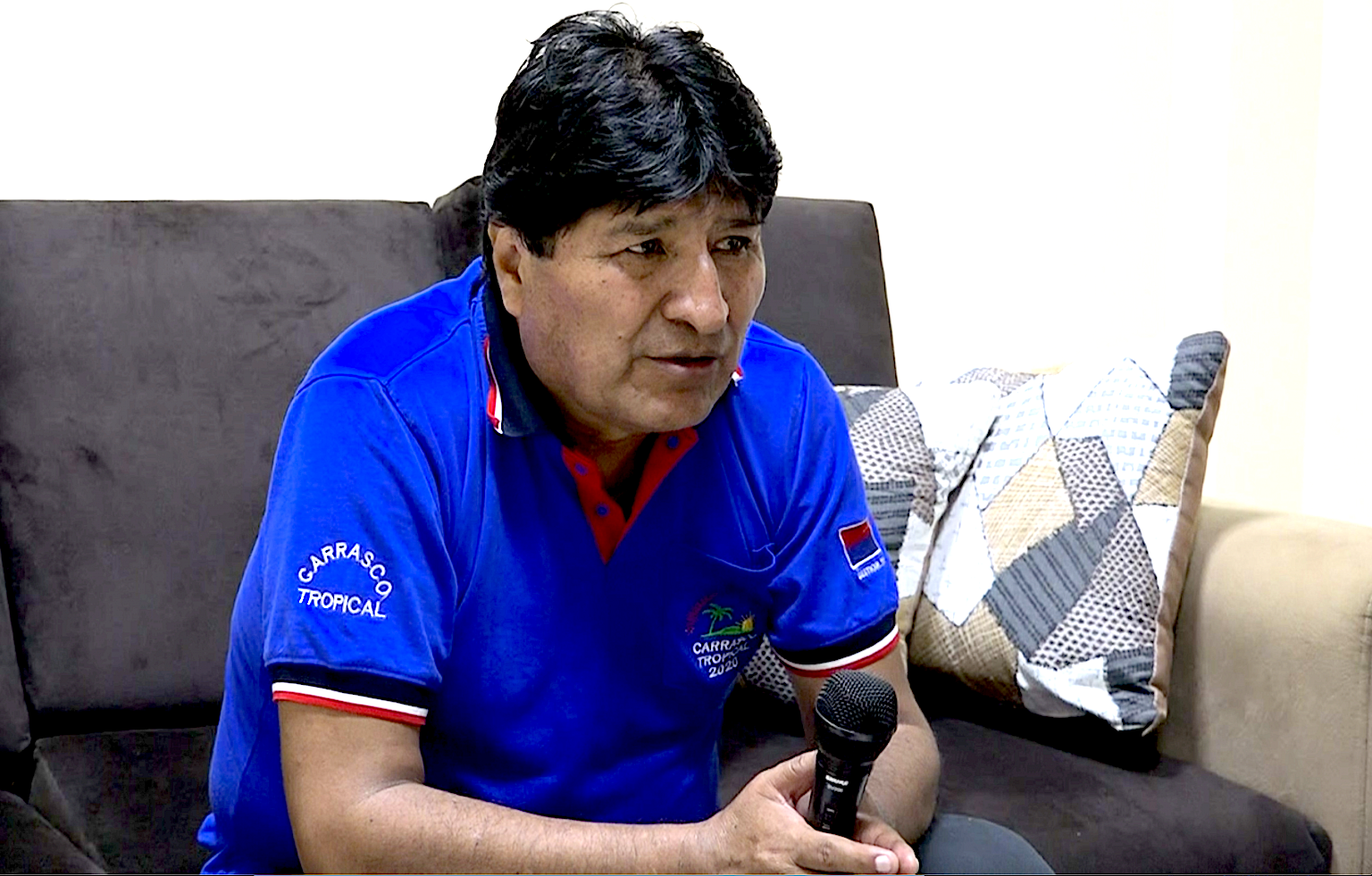
Evo Morales, Bolivia’s first indigenous president. (Matt Kennard/DCUK)
By Matt Kennard
Declassified U.K.
- THE COUP: ‘The U.K. participated in it – all for lithium’
- THE BRITISH: ‘Superiority is so important to them, the ability to dominate’
- THE U.S. : ‘Any relationship with them is always subject to conditions’
- NEW MODEL: ‘We no longer submit to transnational corporations’
- JULIAN ASSANGE: ‘The detention of our friend is an intimidation’
- NATO: ‘We need a global campaign to eliminate it’
- BOLIVIA: ‘We are putting anti-imperialism into practice’
 When Evo Morales, Bolivia’s first indigenous president, was overthrown in a British-backed coup in November 2019, many believed his life was in danger. Latin America’s history is littered with liberation leaders cut down by vengeful imperial powers.
When Evo Morales, Bolivia’s first indigenous president, was overthrown in a British-backed coup in November 2019, many believed his life was in danger. Latin America’s history is littered with liberation leaders cut down by vengeful imperial powers.
Legendary resistance leader Túpac Katari, like Morales from the Aymara indigenous group, had his limbs tied to four horses by the Spanish before they bolted and he was ripped apart in 1781.
Some 238 years later, Bolivia’s self-declared “interim president,” Jeanine Áñez, appeared in Congress days after the coup against Morales brandishing a huge leatherbound Bible. “The Bible has returned to the government palace,” she announced.
Her new regime immediately forced through Decree 4078 which gave immunity to the military for any actions taken in “the defence of society and maintenance of public order.” It was a green-light. The following day, 10 unarmed protestors were massacred by security forces.
When the coup was looking inevitable, Morales had gone underground.
His destination, with his Vice President Álvaro García Linera, was El Trópico de Cochabamba, a tropical area deep in the Amazon rainforest in central Bolivia, and the heartland of his Movimiento al Socialismo (MAS) party and its indigenous base.
Before he officially resigned, he flew to the remote Chimoré airport where local coca farmers had closed off access roads.
Coca leaf forms the basis of cocaine and the airport, before Morales became leader, had been a strategic base for the U.S. Drug Enforcement Administration (DEA) in the region. Morales had kicked the DEA out of Bolivia in 2008 and converted the base into a civilian airport. Coca production soon went down.
Days after Morales and Linera arrived in El Trópico, Mexico’s left-wing President Andrés Manuel López Obrador sent a plane to rescue them, flying them out of Chimoré airport again.
Obrador later said that the Bolivian armed forces targeted the aircraft with an RPG rocket moments after it took off. It appears the U.K.-backed coup regime wanted the deposed president – who had served for 13 years – dead. Morales credits Obrador with saving his life.
Villa Tunari
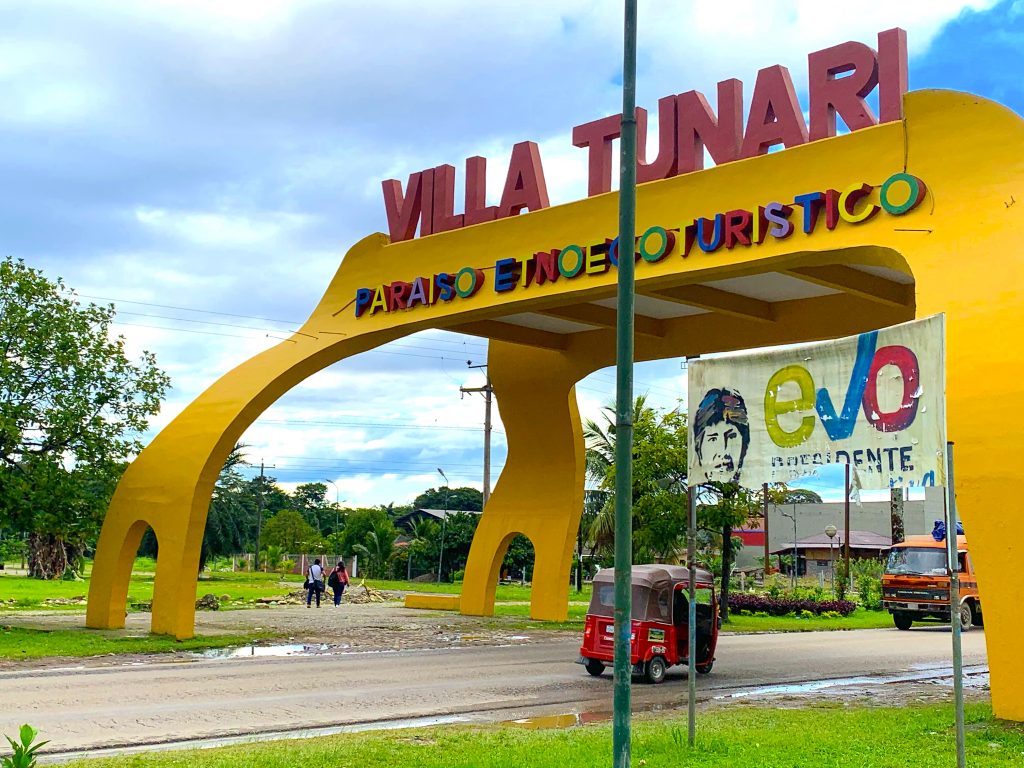
Entrance to the town of Villa Tunari in central Bolivia, where Evo Morales now lives. (Matt Kennard/DCUK)
Morales is back in El Trópico now, but in very different circumstances.
After a year of the “interim government,” democracy was eventually restored in October 2020 and Morales’ MAS won the elections again. The new President Luis Arce, formerly Morales’ economy minister, took power and Morales made a triumphant return from exile in Argentina.
After a tour of much of the country on foot, Morales settled back in El Trópico.
He has recently moved into a house in Villa Tunari, a small town that sits just 20 miles down the road from Chimoré airport. It has a population of just over 3,000.
To get there from Cochabamba, the nearest city, takes four hours in the back of one of the minibuses which leave every ten minutes. On the way out you pass through Sacaba, the city where the regime massacred 10 protestors the day after it granted impunity to the military.
As the minivan gets deeper into El Trópico, the significance of Morales and his MAS party becomes increasingly obvious.
The breezeblock houses with corrugated iron roofs, the accommodation of the world’s poor, start to have murals with Morales’s face on the side. His name in block capitals – EVO – is soon everywhere. So is the word MAS.
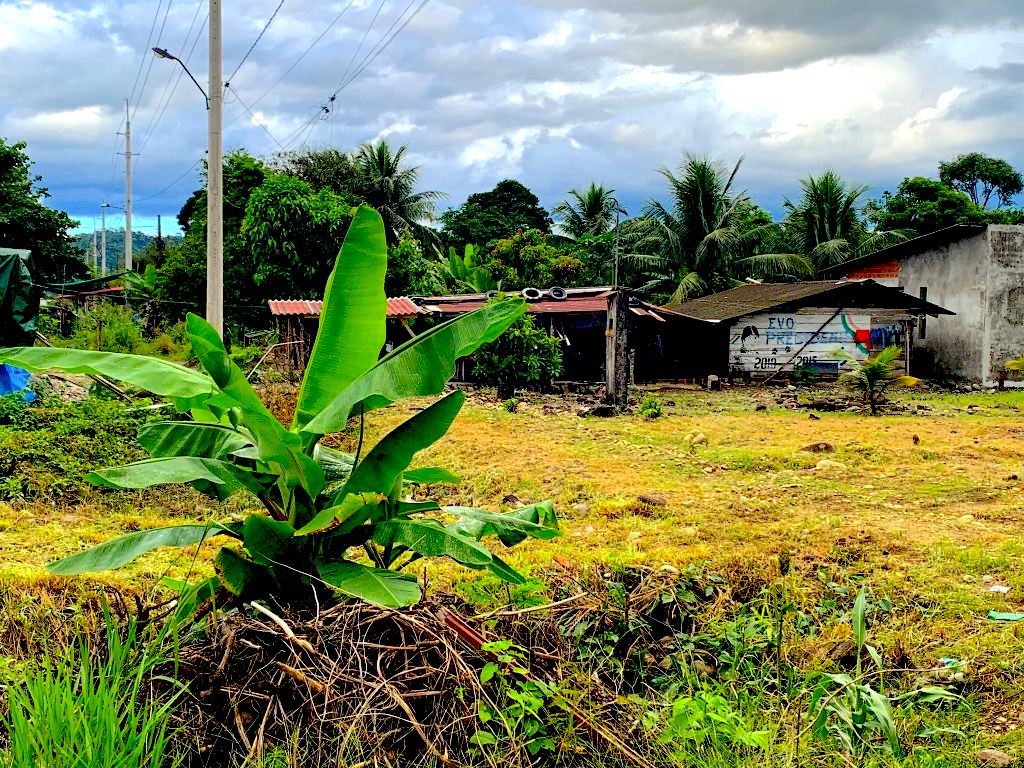
“Evo Presidente”on wall of house in El Trópico de Cochabamba. (Matt Kennard/DCUK)
Tunari itself is a traditional indigenous town and tourist destination, surrounded by national parks. The tourist industry has picked up again since democracy was restored.
With El Trópico forming the backbone of support for Morales and MAS it was subjected to repression during the coup regime’s time in power. For a period, the Áñez regime disabled bank machines in the region, an effort to isolate it completely.
But Tunari is buzzing with life again now. Along its main strip are lines of busy fried chicken and fish restaurants. Buses sit pumping fumes at the town’s transport hub, while hotels and hostels fan off down side roads. A roiling sepia-coloured river runs down the side of the town. It looks like the stereotypical Latin American backpacker stop-off.
‘Strategic Partner’
I arrive in Tunari late on a Saturday afternoon after a long flight to Cochabamba and the four-hour ride in a minibus.
The interview with Morales is scheduled for Monday, but when I arrive and turn on the WiFi on my phone, I receive a raft of messages from his assistant. Morales is nearly done for the day and wants to do the interview later that evening, in a couple of hours. He also wants to do it at his house. Morales is notorious for his work ethic.
Not long after, my colleague who will film the interview comes to pick me up. In the middle of a tropical rainstorm with sheets of water falling like bricks, we take a tuk-tuk into the town and sit under a tarpaulin sipping coffee, waiting for the call from his assistant.
Eventually it comes, and we pile into another tuk-tuk and go through the back streets of the town before we reach the walls of a nondescript house. A woman comes out to meet us and ushers us in. We go into the living room, which is bare apart from two sofas. I later find out this is the first interview with a journalist Morales has ever done at his house.
I got the interview because of an investigation I wrote in March 2021 revealing the U.K.’s support for the coup which deposed Morales.
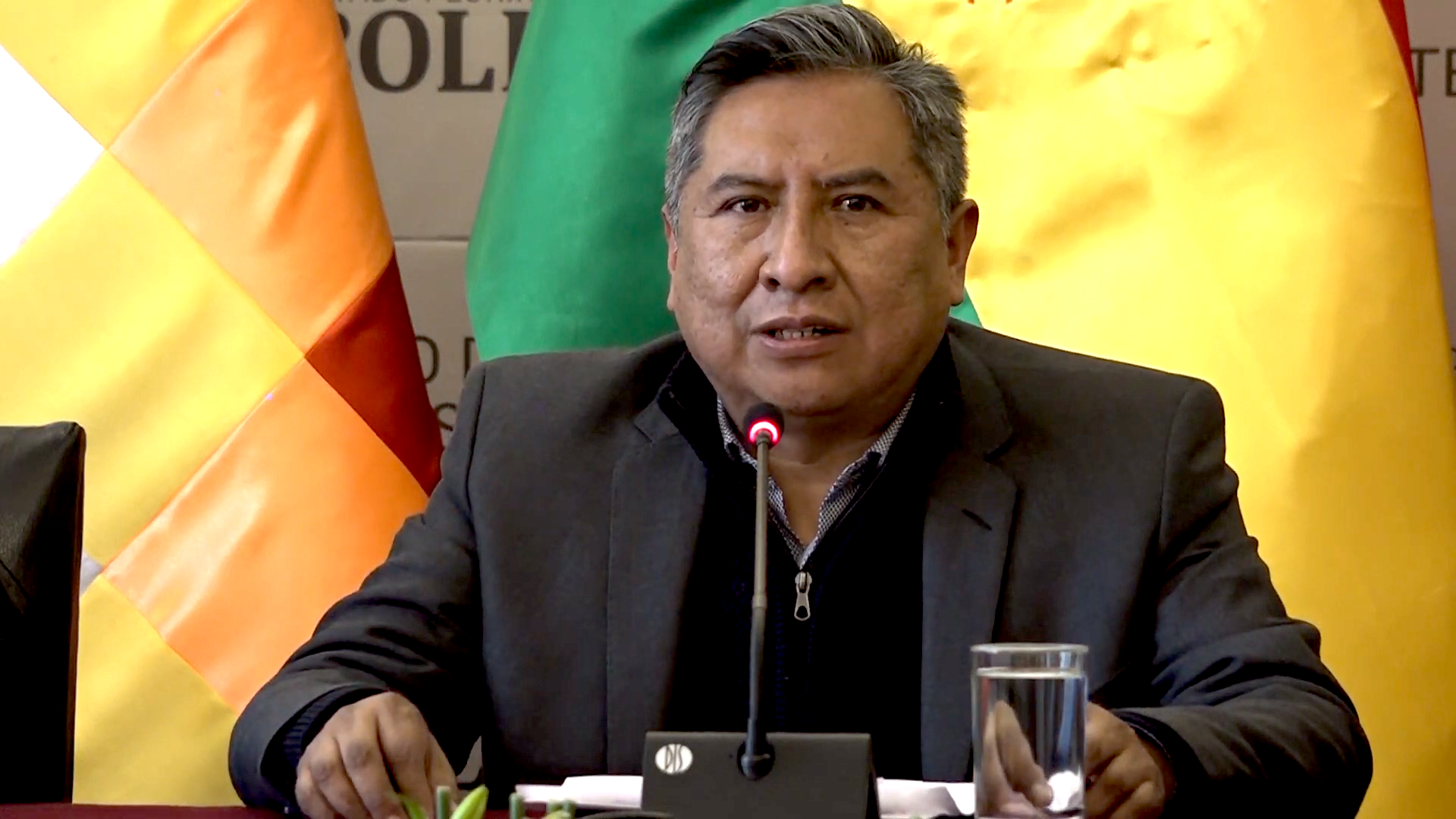
Bolivian Foreign Minister Rogelio Mayta in August 2021. (Abya Yala Televisión, CC BY 3.0, Wikimedia Commons)
The British Foreign Office released 30 pages of documents about programs run by its embassy in Bolivia. These showed it appeared to have paid an Oxford-based company to optimise “exploitation” of Bolivia’s lithium deposits in the month after Morales fled the country.
It also showed the U.K. embassy in La Paz acted as “strategic partner” to the coup regime and organized an international mining event in Bolivia four months after democracy was overthrown.
The story went viral in Bolivia. The foreign minister, Rogelio Mayta, called in the country’s U.K. Ambassador Jeff Glekin to explain the contents of the article and requested a report on the findings. The British embassy in La Paz, the capital of Bolivia, released a statement claiming Declassified was engaged in a “campaign of disinformation,” but provided no evidence.
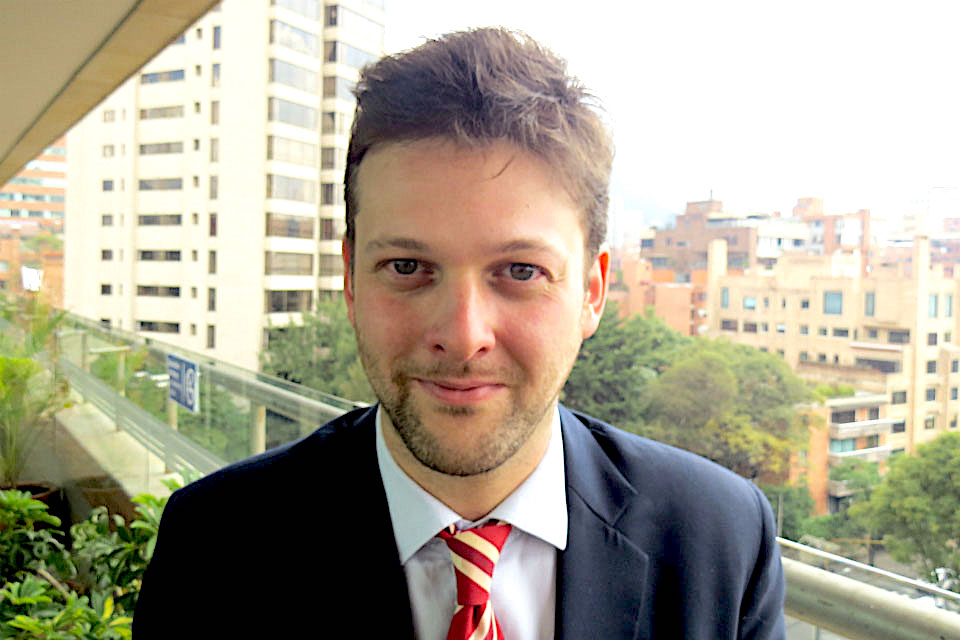
Jeff Glekin, Britain’s ambassador to Bolivia since 2019. (U.K. government)
Industrializing Bolivia
Local journalists told me that Morales often mentions the article in his speeches, so I start with that.
“Just last year, through the media, we were informed that England had also participated in the coup,” he tells me. This, he continues, was a “blow against our economic model, because our economic model has produced results.”
He adds:
“It is an economic model that belongs to the people, not to the empire. An economic model that does not come from the International Monetary Fund. An economic model that comes from the social movements.”
Morales continues: “When we came to government in 2006, Bolivia was the last country in South America in terms of economic and development indicators, the penultimate country in all of America.”
Over the next 13 years of his government Bolivia experienced its most stable period since it declared independence in 1825, and achieved unprecedented economic success, even praised by the I.M.F. and World Bank. Crucially, this success was translated into unprecedented improvements for Bolivia’s poor.
“For the first six years we had the highest levels of economic growth in all of South America and that was because of those policies that came from social movements based on nationalisation,” Morales tells me.
He was part of the “pink tide” of left-wing governments in Latin America in the 2000s, but his model was more economically radical than most.
On his hundredth day in office, Morales moved to nationalize Bolivia’s oil and gas reserves, ordering the military to occupy the country’s gas fields and giving foreign investors a six-month deadline to comply with demands or leave.
Morales believes it was this program of nationalization that led to the Western-backed coup against him.
“I continue to be convinced that the empire, capitalism, imperialism, do not accept that there is an economic model that is better than neoliberalism,” he tells me. “The coup was against our economic model…we showed that another Bolivia is possible.”
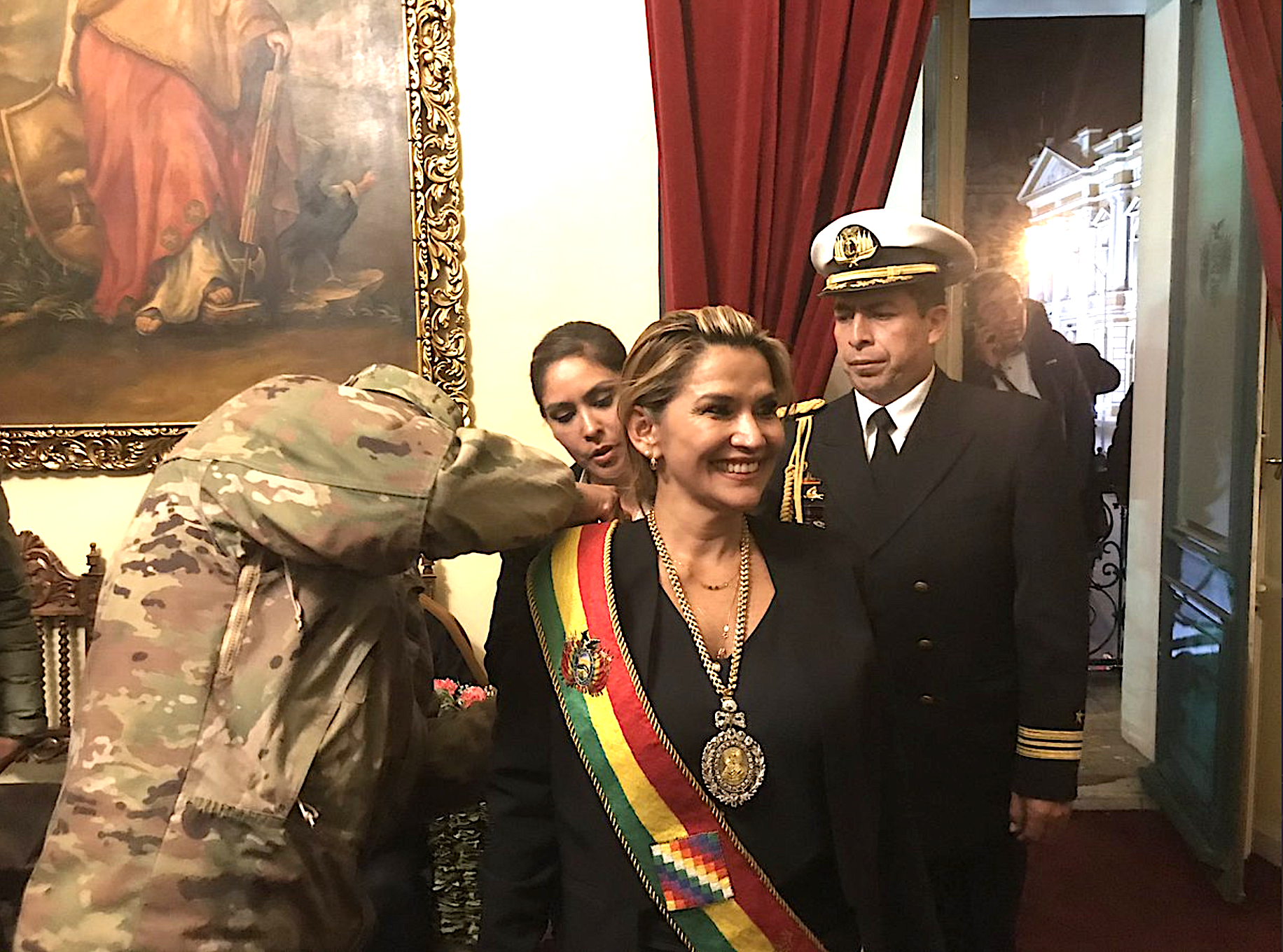
A military officer adorns Jeanine Áñez with the presidential medal of Bolivia, Nov. 12, 2019. (Government of Bolivia, CC BY 2.0, Wikimedia Commons)
Morales says the second phase of the revolution — after nationalization — was industrialization. “The most important part was lithium,” he adds.
Bolivia has the world’s second-largest reserves of lithium, a metal that is used to make batteries and which has become increasingly coveted due to the burgeoning electric car industry.
Morales remembers a formative trip to South Korea he made in 2010.
“We were discussing bilateral agreements, investments, co-operation and they took me to visit a factory that produced lithium batteries,” Morales says. “Interestingly, South Korea was asking us for lithium, as a raw material.”
Morales said he asked at the factory how much it cost to build the facility. They told him $300m.
“Our international reserves were growing,” he adds. “I said at that moment, ‘I can guarantee $300 million.’ I said to the Koreans, ‘let’s replicate this factory in Bolivia. I can guarantee your investment.’ ” The Koreans said no.
“That’s when I realized that industrialized countries only want us Latin Americans so that we can guarantee them their raw materials. They don’t want us to give us the added value.”
“Industrialized countries only want us Latin Americans so that we can guarantee them their raw materials.”
At that point, Morales resolved to start industrializing Bolivia, reversing half a millennium of colonial history.
The traditional imperial dynamic which had kept Bolivia poor was that rich countries would extract raw materials, send them to Europe to be made into products, industrializing Europe at the same time, and then sell them back to Bolivia as finished products, at a mark-up.
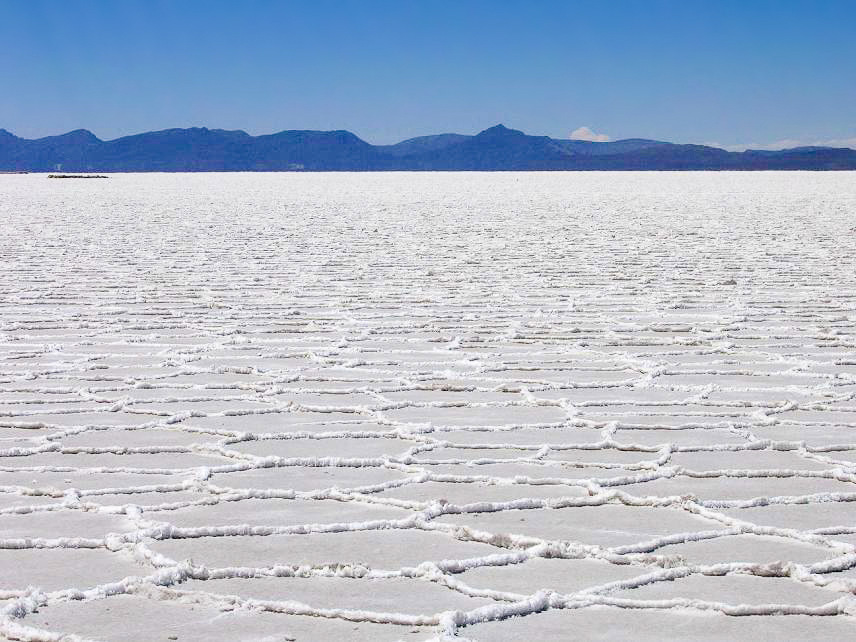
Salar de Uyuni (or Salar de Tunupa) salt flat in Bolivia covers a pool of brine that is exceptionally rich in lithium. (Anouchka Une, Wikimedia Commons)
With the country’s lithium deposits, Morales was adamant this system was finished. Bolivia would not just extract the lithium. It would build the batteries, too. Morales calls it “value added.”
“We started with a laboratory, obviously with international experts that we hired,” he says. “Then we moved on to a pilot plant. We invested around $20 million, and now it’s working. Every year it produces about 200 tonnes of lithium carbonate, and lithium batteries, in Potosí.”
Potosí is a city in southern Bolivia that became the center of the Spanish empire in Latin America after gargantuan silver deposits were discovered there in the 16th century. Called “the first city of capitalism,” it is estimated that up to 8 million indigenous people died mining Potosi’s Cerro Rico (Rich Hill) for silver, all of it destined for Europe.
Morales continues: “We had a plan to install 42 new [lithium] plants by 2029. It was estimated that profits would be five billion dollars. Profits!”
“That’s when the coup came,” he says. “The U.S. says China’s presence is not permitted but … having a market in China is very important; also, in Germany. The next step was with Russia, and then came the coup.”
He continues: “Just last year, we found out that England had also participated in the coup — all for lithium.”
But Morales says his people’s long struggle for control over their own riches is not unique.
“This is a struggle not only in Bolivia, or Latin America, but throughout the world,” Morales says. “Who do natural resources belong to? The people under the control of their state? Or are they privatized under the control of transnationals so they can plunder our natural resources?”
Partners or Bosses?
Morales’ nationalization program put him on a collision course with powerful transnational companies that were used to the traditional imperial dynamic.
“During the 2005 campaign, we said, if corporations want to be here, they do so as partners, or to provide their services, but not as bosses or owners of our natural resources,” Morales says. “We established a political position with regards to transnational companies: we talk, we negotiate, but we do not submit to transnational corporations.”
Morales gives the example of hydrocarbon contracts signed by previous governments.
“In previous contracts — contracts made by neoliberals — it literally said ‘the title-holder acquires the rights to the product at the mouth of the well.’ Who is the title-holder? The transnational oil company. They want it from the mouth of the well.”
He adds:
“The companies tell us that when it is underground it belongs to the Bolivians, but when it comes out of the ground it is no longer the Bolivians. From the moment it comes out, the transnational corporations have an acquired right to it. So, we said, inside or outside, it all belongs to Bolivians.”
Morales continues:
“The most important thing now is that of 100 percent revenue, 82 percent is for Bolivians and 18 percent for corporations. Before it was 82 percent for the companies, 18 percent for the Bolivians, and the state had no control over production – how much they produced, how they produced – nothing.”
It was a hard battle, Morales adds, and some companies left.
“We respect their choice to leave,” Morales says. “But we said that instead of going to the CIADI, any legal claims would be made in Bolivia. That was another battle that we faced, so that claims would be dealt with at the national level because it’s an issue of sovereignty and dignity.”
CIADI is the Spanish acronym of ICSID, which is the International Centre for Settlement of Investment Disputes. A little-known branch of the World Bank, it’s the main supranational venue allowing transnational corporations to sue states for enacting policies which they say infringe on their “investor rights”. In reality, it’s a system which often allows corporations to overrule or chill sovereign state policymaking — or win huge sums in compensation.
[Related: COP26: Emitters Sue To Chill Climate Measures]
This “arbitration” system has seen a British company taking Bolivia to court. In 2010, Morales nationalized the country’s largest energy provider, Empresa Eléctrica Guaracachi.
The U.K. power investor Rurelec, which indirectly held a 50.001 percent stake in the company, took Bolivia to another investor-state court, this time at the Hague, demanding $100m in compensation.
Bolivia was eventually ordered to pay Rurelec $35m; after further negotiations, the two sides settled on a payment of just over $31m in May 2014.
Rurelec celebrated the receipt of this award with a series of press releases on its website. “My only sadness is that it has taken so long to reach a settlement,” said the fund’s CEO in a statement. “All we wanted was a friendly negotiation and a handshake from President Morales.”
Placing Conditions
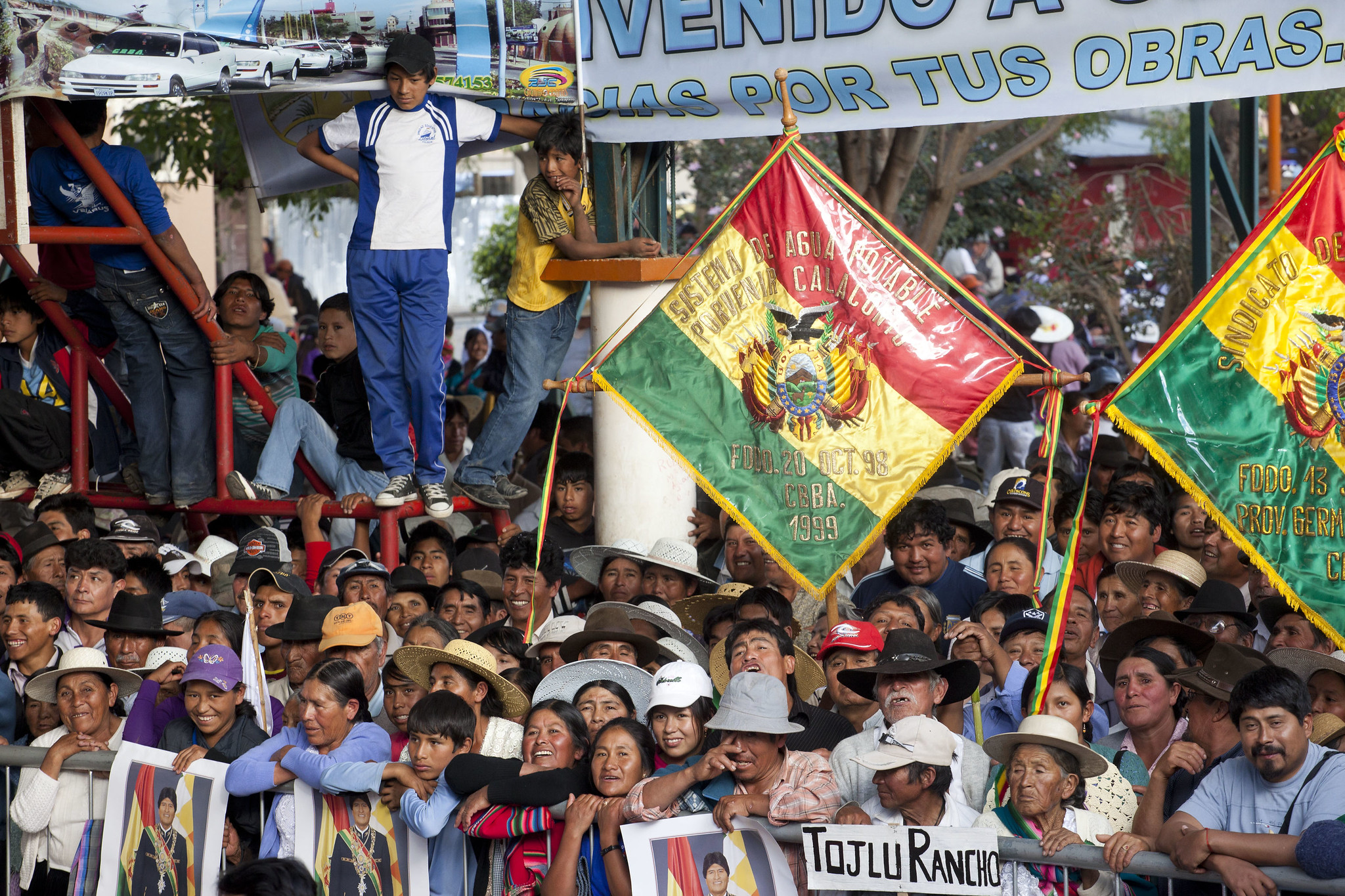
Crowd listening to President Evo Morales speak at the Rural Alliance Fair in Cliza, Bolivia, July 6, 2013. (Dominic Chavez/World Bank, CC BY-NC-ND 2.0)
Since the formation of the Monroe Doctrine in 1823 — which claimed the Western Hemisphere as the U.S. sphere of influence — Bolivia has been largely under its control. This changed for the first time with the advent of the Morales government.
“As a state, we want to have diplomatic relationships with all the world, but based on mutual respect,” Morales tells me. “The problem we have with the U.S. is that any relationship with them is always subject to conditions.”
Morales continues: “It’s important to have commerce and relations based on mutual benefit, not competition. And we found some European countries that do that. But above all we found China. Diplomatic relationships with them aren’t based on conditions.”
He adds: “With the U.S., for example, their economic plan, the Millennium Challenge Corporation, if you wanted to access it you had to, in exchange, privatise your natural resources.”
“With the U.S., for example, their economic plan, the Millennium Challenge Corporation, if you wanted to access it you had to, in exchange, privatise your natural resources.”
The MCC was a project of the George W. Bush administration which sought to run aid more like a business. Headed by a CEO, it is funded by public money but acts autonomously and has a corporation-style board which includes business people expert in making money. The aid “compacts” it signs with countries come with attached policy “conditionalities.”
“China doesn’t place any conditions on us, same as Russia, and like some countries in Europe,” Morales adds. “So that is the difference.”
A window into how the U.S. government has traditionally viewed Bolivia comes from a June 1971 private conversation between President Nixon and his national security adviser Henry Kissinger.
“Kissinger: We are having a major problem in Bolivia, too. And—
Nixon: I got that. [US Treasury Secretary John] Connally mentioned that. What do you want to do about that?
Kissinger: I’ve told [CIA deputy director for plans Thomas] Karamessines to crank up an operation, post-haste. Even the Ambassador there, who’s been a softy, is now saying that we must start playing with the military there or the thing is going to go down the drain.
Nixon: Yeah.
Kissinger: That’s due in on Monday.
Nixon: What does Karamessines think we need? A coup?
Kissinger: We’ll see what we can, whether—in what context. They’re going to squeeze us out in another two months. They’ve already gotten rid of the Peace Corps, which is an asset, but now they want to get rid of [US Information Agency] and military people. And I don’t know whether we can even think of a coup, but we have to find out what the lay of the land is there. I mean, before they do a coup, we would—
Nixon: Remember, we gave those goddamn Bolivians that tin.
Kissinger: Well, we can always reverse that. Then we—
Nixon: Reverse that.”
The “major problem” in Bolivia Kissinger was talking about was Juan José Torres, a socialist leader who had taken power the previous year and was trying to make the country independent.
The U.S. coup came two months after Nixon and Kissinger’s conversation and military man General Hugo Banzer was installed. Torres went into exile and five years later, in 1976, he was murdered in Buenos Aires by Operation Condor, a C.I.A.-backed right-wing terror network operating across Latin America at the time.
Before Morales, Torres was the last left-wing leader in Bolivia.
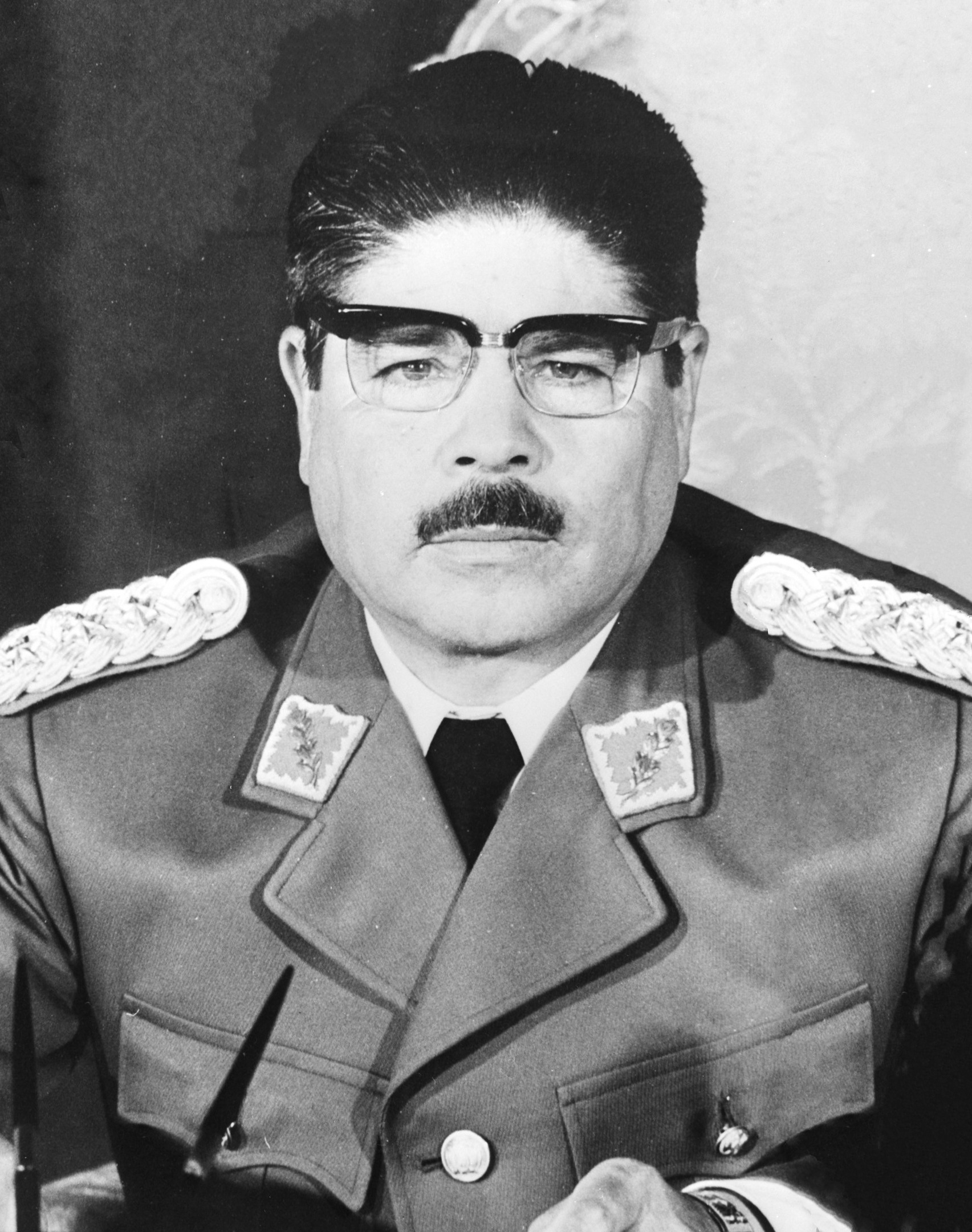
Juan José Torres in 1971. (Dutch National Archives, The Hague, CC0, Wikimedia Commons)
The Party
The British government effusively supported the 2019 coup in Bolivia, warmly welcoming the new regime and praising the potential it opened up for British companies to make money from the country’s natural resources, particularly lithium.
On Dec. 14, 2019 — three weeks after the U.K.-backed regime had carried out another massacre of protesters — British Ambassador Jeff Glekin even hosted a fancy-dress Downton Abbey-themed English tea party at the British embassy. Victoria sponge cake was served.
“We lament a lot that the English were celebrating the sight of dead people,” Morales tells me. “Of course, that is our history since the European invasion of 1492.”
He adds: “I respected some European countries for their liberation from monarchies, but there is a continuation of oligarchy, of monarchy, and of hierarchy, which we do not share.” Morales says the new millennium “is a millennium of the people, not of monarchies, nor hierarchies, nor oligarchies. This is our struggle.”
He adds on the British: “Superiority is so important to them, the ability to dominate. We are humble people, poor people, that is our difference. It’s reprehensible that they don’t have a principle of humanity, of brotherhood. They are, instead, slaves to the policies of how to dominate.”
On the relationship with the U.K., Morales said: “There are deep ideological, programmatic, cultural, class differences, but especially of principles and doctrine.”
“There are deep ideological, programmatic, cultural, class differences, but especially of principles and doctrine.”
He adds: “There are countries in which, with their state policy, they always have a mentality of repressing, isolating or condemning, repudiating sisters and brothers who speak of truth and defend life and defend humanity. I do not accept this.”

Jeff Glekin, U.K. ambassador to Bolivia, hosts a Downton Abbey-themed English tea party at the British embassy, on Dec. 14, 2019, three weeks after regime forces gunned down 10 unarmed protesters. Anonymisation by DeclassifiedUK. (Jeff Glekin/Twitter)
I mention that when I contacted the U.K. Foreign Office for my original investigation they told me simply “there was no coup” in November 2019. What does Morales think of this?
“It is impossible to comprehend how a European country…in the 21st century has the mentality that this was not a coup, it doesn’t make sense.”
He adds:
“It’s a totally colonial mindset. They think that some countries are the property of other nations. They think God put them there, so the world belongs to the U.S. and the U.K. That’s why the rebellions and the uprisings will continue.”
Morales grew up seeing the results of his country being the property of other countries. Brought up in extreme poverty, four of his six siblings died in childhood. He cut his teeth as a “cocalero” (coca picker) and was politicized by the U.S. “war on drugs” in Bolivia. He became a national figure after he was elected leader of the union of coca growers in 1996.
‘An Intimidation’
When WikiLeaks began publishing U.S. diplomatic cables in 2010, it revealed an extensive campaign by the U.S. embassy in La Paz to remove Morales’s government. There had long been suspicions but the cables showed clear U.S. links with the opposition.
I ask Morales about Julian Assange, the WikiLeaks founder, who is now in his fourth year inside Belmarsh maximum security prison for exposing these and other U.S. imperial operations.
“Sometimes the empire talks about freedom of expression, but deep down they are enemies of freedom of expression,” Morales says. “The empire, when someone tells the truth…that is when the retaliation begins, like with Assange.”
He adds: “Some people…rise up against these policies because they feel it is important to defend life, equality, freedom, dignity. Then the retaliation comes.”
“I salute and admire those who, driven by principles about liberation for the people, tell the truth,” Morales says.
“This detention of our friend [Assange] is an escalation, an intimidation so that all the crimes against humanity committed by the different governments of the United States are never revealed. So many interventions, so many invasions, so much looting.”
Morales adds: “This rebellion also includes ex-C.I.A. agents, ex-DEA agents who tell the truth about the United States. The retaliation always comes.”
“The reality is that this is not going to end, it’s going to continue,” Morales continues. “So, to our brother [Assange] I send our respect and our admiration. I hope there are more revelations to come so that the world can become informed … of all the criminality in the world.”
“This detention of our friend Assange is an intimidation so all the crimes against humanity committed by the United States are never revealed.”
Morales believes that information and communication for the “people who do not have a voice” is the most important issue today. He is currently working on building independent media in Bolivia.
“The people without many means of communication are faced with a hard struggle to communicate,” Morales says. “We have some experience, for example in El Trópico. We have a radio station, we don’t have a national audience, but it is listened to and followed a lot by the right-wing media.” They follow mainly to find attack lines on Morales.
“How nice it would be if the people had their own media channels,” Morales continues. “This is the challenge the people have. This media we have, which belongs to the empire or the right-wing in Bolivia, that’s how it is in all Latin America. It defends its interests…and they are never with the people.”
He adds:
“When, for example, the right-wing makes a mistake it is never revealed, it’s covered-up and they protect themselves. The [corporate] media is there to defend their big industries, their lands, their banks, and they want to humiliate the Bolivian peoples, the humble people of the world.”
Latin America has long been the world’s home of democratic socialism. I ask Morales if he has hope for the future. “In South America, we are not in times of Hugo Chávez, Lula, [Néstor] Kirchner, [Rafael] Correa,” he says.
Together these progressive leaders pushed for the integration of Latin America and the Caribbean, through organisations such as the Union of South American Nations (UNASUR) in 2008 and the Community of Latin American and Caribbean States (CELAC) in 2011.
“We came down, but now we are recovering,” Morales adds.
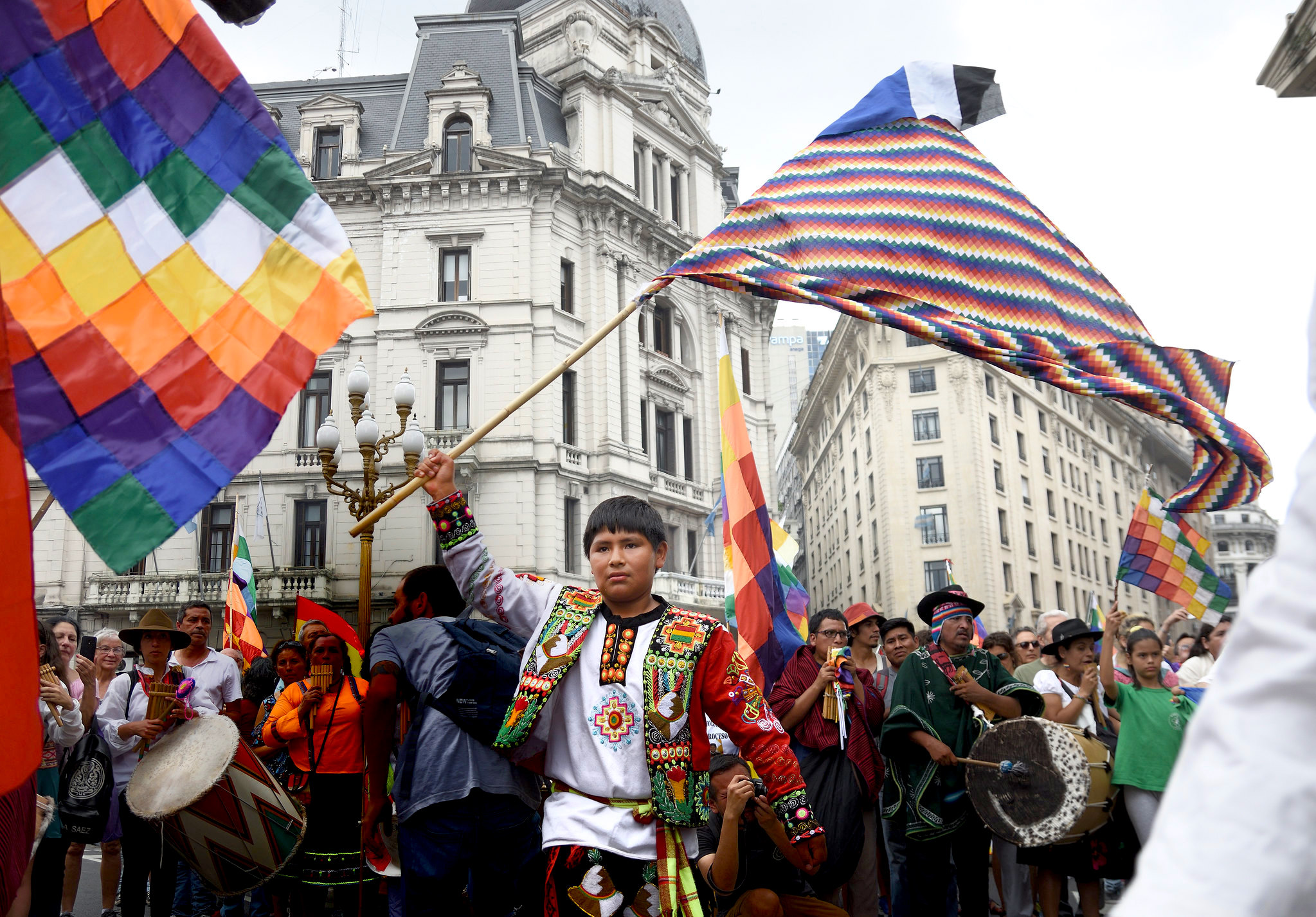
Nov. 18, 2019: Demonstration in support of Evo Morales in Buenos Aires, Argentina. (Santiago Sito, Flickr, CC BY-NC-ND 2.0)
Recent events point to another left-wing resurgence in the continent. Morales points to recent victories in Peru, Chile and Colombia and Lula’s expected return to the presidency in Brazil soon.
“Those times are returning,” he says. “We need to again consolidate these democratic revolutions for the good of humanity. I have a lot of hope.”
He continues: “In politics we must ask ourselves: are we with the people or are we with the empire? If we are with the people, we make a country; if we are with the empire, we make money.
“If we are with the people, we fight for life, for humanity; if we are with the empire, we are with the politics of death, the culture of death, interventions, and pillaging of the people. That is what we ask ourselves as humans, as leaders: ‘Are we at the service of our people?’”
“In politics we must ask ourselves: are we with the people or are we with the empire?”
Morales then brings up the Russian invasion of Ukraine. “I feel that it is time now, seeing the problems between Russia and Ukraine … to do an international campaign, globally, first to explain that NATO is — ultimately — the United States.”
He adds: “Better still a campaign orientated around how to eliminate NATO. NATO is not a guarantee for humanity or for life. I do not accept — in fact, I condemn — how they can exclude Russia from the U.N. Human Rights Council. When the U.S. has intervened in Iraq, in Libya, in so many countries in recent years, why have they not been expelled from the Human Rights Council? Why was that never questioned?”
He adds: “We have profound ideological differences with the politics implemented by the United States using NATO, which are based on interventionism and militarism.”
He finishes: “Between Russian and Ukraine they want to reach an agreement and [the U.S. ] keeps provoking war, the U.S. military industry, which is able to live thanks to war, and they provoke wars in order to sell their weapons. That’s the other reality we live in.”
The Water Wars
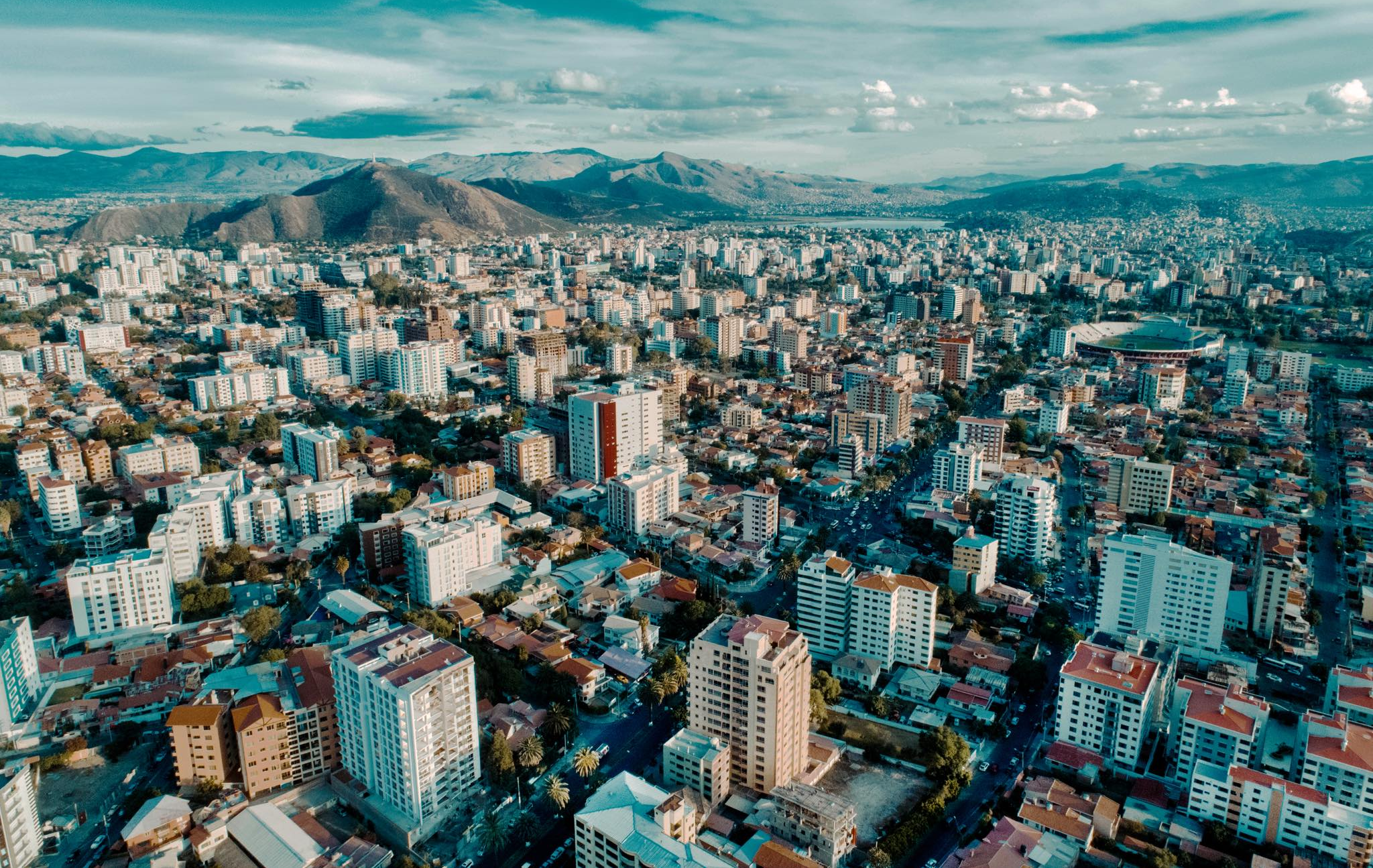
Cochabamba, Bolivia. (JH PLATA Filmmaker, CC BY-SA 4.0, Wikimedia Commons)
Morales is the most successful president in Bolivia’s history — and one of the most successful in the history of Latin America. His period as president is also arguably the most successful sustained experiment in democratic socialism in human history. That is dangerous for the imperial powers, who have long warned about the threat of a good example.
He also called time on 500 years of white rule in Bolivia, bringing the country into the modern world for the first time. The new constitution in 2009 “refounded” Bolivia as a “plurinational” state, allowing self-rule for the nation’s indigenous peoples. It created a new Congress with seats reserved for Bolivia’s smaller indigenous groups and recognised the Andean earth deity Pachamama instead of the Roman Catholic Church.
“The Indians — or the social movements — how is it possible they could lead a revolution?” Morales asks, impersonating the traditional white Bolivian elite and their imperial patrons. “A democratic revolution, based on the votes of the people, which raised the consciousness of the people, and even reached the government.”
He adds: “Still today there are people that think ‘we have to dominate the Indians, to command the Indians.’ In the interior of Bolivia that is the mentality — ‘they are slaves, they are animals, we have to eradicate them.’ It is our battle to overcome that mentality.”
On the way back into Cochambamba, a bustling indigenous city that is Bolivia’s fourth largest, I’m reminded that it was here that this epic struggle began.
In early 2000, the Cochabamba “Water Wars” raged after the local water company was privatized and American company Bechtel drastically raised prices, even prohibiting collecting rain water. Tens of thousands of protestors battled police on the streets of the city for months.
“Arriving with political power allowed us to close the U.S. military base, we expelled the C.I.A.”
The coca growers of Bolivia, led by a little-known congressman called Evo Morales, joined the demonstrators and demanded an end to the U.S.-sponsored program of eradication of their crops.
After months of protest and activism, in April 2000 the Bolivian government agreed to reverse the privatization. A revolution had begun. The people took power five years later, reversing 500 years of colonial rule in Bolivia.
However, in 2022, danger still lurks. The U.S. and Britain continue working to bring Bolivia to heel, alongside their local compradors. But, in this indigenous-majority country, they appear to have met their match.
Morales tells me that constructing union power was the basis of the democratic revolution, but the most important thing was getting into government.
“Arriving with political power allowed us to close the U.S. military base, we expelled the DEA, we expelled the CIA. Incidentally, the U.S. ambassador who was conspiring, who was financing the 2008 coup [attempt], we expelled him, too.”
He pauses. “We’re not just talking about anti-imperialism, we’re putting anti-imperialism into practice.”
Matt Kennard is chief investigator at Declassified U.K.. he was a fellow and then director at the Centre for Investigative Journalism in London. Follow him on twitter @kennardmatt
This article is from Declassified UK.

Fabulous and informative interview. I tip my hat to Evo Morales as one who truly serves his people – Bravo ! As a Norte Americano, I can only dream of such a political figure in my own utterly corrupt / morally bankrupt country.
For me, one of the most important points made in this piece was when Morales states: “China doesn’t place any conditions on us, same as Russia, and like some countries in Europe,” Morales adds. “So that is the difference.” The world is changing, people want, must have, autonomy if not self-determination. The US, UK, NATO, etc., are going down the tubes to self-destruction, let us hope, they don’t bring the rest of the world with them.
Wow, great to hear from Evo Morales again. I was wondering where he was because as a Canadian I feel a guilty responsibility for the coup that had him at gun point – “get on the plane toMexico or be shot” – that was arranged by the LIMA group. Canada’s Deputy P.M. Chrystia Freeland was the leader of the LIMA group.
Fast forward to the Ukraine/NATO provocations of today, Freeland has history there too – her family came from Ukraine to Alberta, Canada. Russia’s 50 million dead in WW two at the hands of the Nazis… her grandfather was on the side of the Germans and there is still a portion of the Ukraine population that proudly displays the Nazi symbols. Fighting socialism is in her heritage.
The recent revival of “the pink tide” in South America should give some hope to Morale’s ambitions to have Bolivia’s natural resources benefit the people of Bolivia. Has the USA/UK/NATO been distracted from South America?
Once again, with apologies for Canada’s involvement, it was good to hear from Evo Morales.
Love you Kevin of Kanada. I’m an Oregonian against the Empire. Good to hear your voice.
“Nixon: Remember, we gave those goddamn Bolivians that tin.”
Words fail me.
Breathtaking. I knew it was bad but I didn’t realize it was THAT bad. More power to Senor Morales. If only we had some of that spirit here in the US.
We’d better get that SPIRIT if we wish to continue as a nation.
Morales believes it was this program of nationalization that led to the Western-backed coup against him.
“I continue to be convinced that the empire, capitalism, imperialism, do not accept that there is an economic model that is better than neoliberalism,” he tells me. “The coup was against our economic model…we showed that another Bolivia is possible.”
Understatement of the century!!!
Matt Kennard’s article and interview video with the amazing Evo Morales is one of the most valuable I have ever had the chance to read/watch.
I’m grateful to Evo Morales for explaining how the deadly AngloSaxon racism has been used by those deadly predators to excuse/justify/ our ugly grabs of other peoples’ land, wealth, ignoring our humanity which would, in a better world, demand from ourselves, if we had any self respect, an obligation to treat other people with respect and humbly engage in trade with equals like a decent person would do.
Here’s one example from the article about that linkage:
“He [Morales] adds on the British: “Superiority is so important to them, the ability to dominate. We are humble people, poor people, that is our difference. It’s reprehensible that they don’t have a principle of humanity, of brotherhood. They are, instead, slaves to the policies of how to dominate.”
On the relationship with the U.K., Morales said: “There are deep ideological, programmatic, cultural, class differences, but especially of principles and doctrine.”
Thank you CN, Matt Kennard and dear Evo Morales!
As Noam Chomsky has expressed in the past – these (I’ll call them vicious white supremacist) politicians are at best 3rd class people. The Evo Morales thinkers are the 1st class people. Humble yes, brilliant yes, the best of humanity, yes.
It’s good to see them in charge for once because the third class peoples are on a course towards self destruction , willing to take the rest of us with them.
For more insight if not historical information concerning “deadly AngloSaxon racism has been used by those deadly predators to excuse/justify/ our ugly grabs of other peoples’ land, wealth” please read Roxanne Dunbar-Ortiz’s ‘Not A Nation of Immigrants: Settler Colonialism, White Supremacy, and A History of Erasure and Exclusion’
When dead, people can neither benefit from justice, nor any longer suffer the consequences of injustice. Despite these factual truths, the only time historical injustice can ever be modified is in the action of the present moment.
However, things are looking repetitively bleak in this highly destructive, epoch-making moment of future human history.
The only truth we – humanity, can readily know are the animate acts (positive/negative) that occur in the here and now!
The only justice for Julian Assange will be for him to walk free. The injustice he has endured to this moment can never be expunged from his story.
If he is martyred, the injustice of the illegitimate suffering and torture he personally has had to endure at the hands of the barbaric, unscrupulous imperial tyranny, will cease for him – the foremost truly humane journalist/publisher.
It is we, the so-called civilized, yet effete, hypocrite populace, who may get to live out the remainder of our ‘daze’ in our self-restrictive thought prisons, staring guiltily, obsequiously, at the systemic, daily injustices we have silently acceded to, to all of our shame.
To the extent of the power of individuals’ conscious; the confidence in the skill of the reasoner is crucial to a more thorough comprehension of truth.
Critical thinking skills is the key to the depth of understanding, in regard to the consequential outcomes for each action taken.
How clearly Evo Morales states the truth of actual, benevolent, humanitarian relationship!
“It’s important to have commerce and relations based on mutual benefit, not on relentless competition” where winner alone, greedily, thoughtlessly, unconscionably takes most of what is plentiful.
“So, the problem is not so much to see what nobody has yet seen, as to think what nobody has yet thought concerning that which everybody sees.” ? Arthur Schopenhauer
This is an informative article. Thank you.
The rapacious greed, murder on an industrial scale, and outright robberies which are the trademarks of UK /USA, are now threatening all life on Earth.
There must be an alternative to their misrule, and thankfully, there is a growing number of people and nations who can facilitate the necessary change.
Unfortunately, the slaves to the West are prepared to slaughter everyone in order to continue their plunder of the planet.
The US Embassy is still in Bolivia, meaning that the CIA is still operating there.
Something on which all Hispanic Americans need to reflect, especially in Colombia, where for the first time, it may be that a truly sovereign government that places the Colombian people ahead of neoliberal multinationals, is set to assume control on August 7. As in all sovereign minded countries everywhere, not just in Latin America, vigilance over perpetual neoconservative interventionist practices is essential, and not always enough. But perhaps if regional rather than individual protective measures are taken, Colombia and other countries can wean themselves from addiction to United States and European serfdom.
The US and the UK…two peas in the same unsavoury pod! The Asses of Evil…No wonder they get along so well.
Hahahahaha. Asses of Evil!!! I love it. Or as someone once said, a carbuncle on the heel of progress.